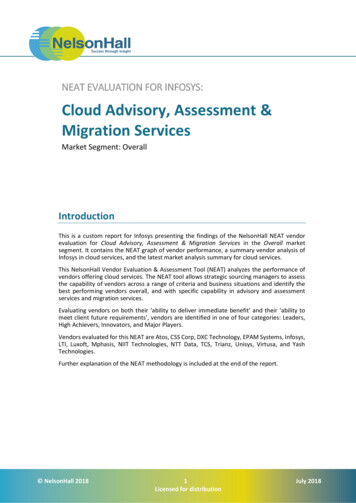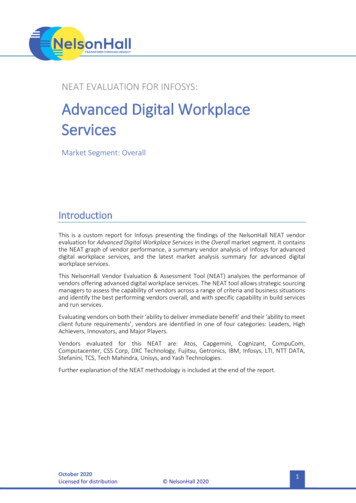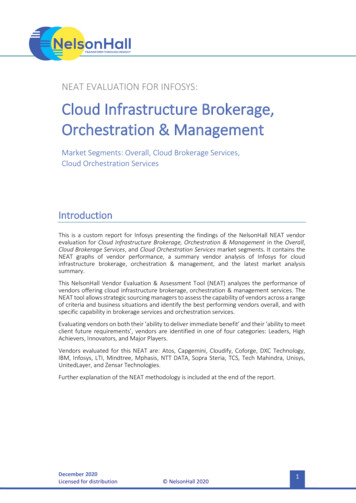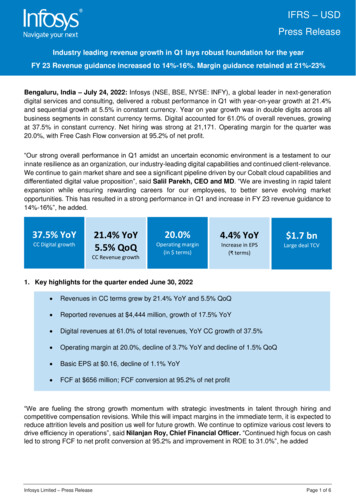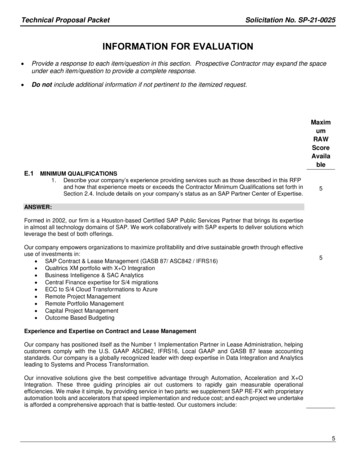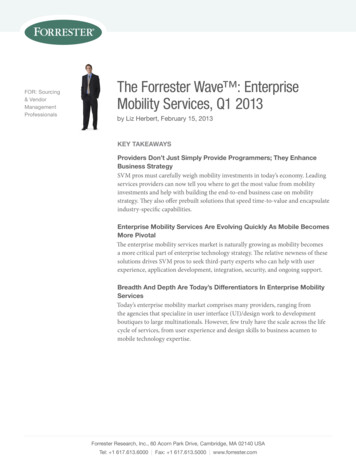
Transcription
REPORT REPRINTInfosys brings its servicesexpertise to data protection andprivacy with iEDPS offeringJANUARY 5 2021By Paige BartleyData protection and privacy have never been more important. Remote work necessitates thesecure and compliant sharing of data across the virtual organization, often spanning regulations andjurisdictions. Infosys Enterprise Data Privacy Suite brings not only core data protection and privacyfeatures but also services that help achieve privacy objectives.THIS REPORT, LICENSED TO INFOSYS, DEVELOPED AND AS PROVIDED BY 451 RESEARCH, LLC,WAS PUBLISHED AS PART OF OUR SYNDICATED MARKET INSIGHT SUBSCRIPTION SERVICE. ITSHALL BE OWNED IN ITS ENTIRETY BY 451 RESEARCH, LLC. THIS REPORT IS SOLELY INTENDEDFOR USE BY THE RECIPIENT AND MAY NOT BE REPRODUCED OR RE-POSTED, IN WHOLE OR INPART, BY THE RECIPIENT WITHOUT EXPRESS PERMISSION FROM 451 RESEARCH. 2021 451 Research, LLC WWW.451RESEARCH.COM
REPORT REPRINTIntroductionThe management of data privacy today is growing more multifaceted, with more distributed meansof data management becoming the norm and regulations continuing to evolve around the world.The expanded remote work model has further complicated the secure sharing and access of data,particularly for multinational businesses. So within a given organization, data privacy efforts canbe extremely broad in terms of stakeholders and technology. Yet responsibility for directing thiseffort is often nebulous. According to 451 Research’s Voice of the Enterprise: Data & Analytics,Data Management & Analytics survey, only 8.4% of respondents report that their organization has adedicated data privacy team holding the primary responsibility for managing data privacy and dataprotection requirements. In half (50.5%) of cases, the IT team holds this de facto responsibility inaddition to their existing workload.Given this complexity and frequent lack of dedicated data privacy responsibility, many organizationscan benefit from professional services and guidance to help achieve both compliance and businessproductivity objectives. This is the approach Infosys is taking with its data privacy and data protectionoffering, the Infosys Enterprise Data Privacy Suite (iEDPS). The platform offers not only core technicalmechanisms for ensuring data protection, but an accompanying broad range of professional supportand consulting services help customers optimize privacy strategy.451 TAKEThe iEDPS offers a broad swath of the core data protection mechanisms that areconsidered table stakes for a functioning enterprise data privacy program, but that is notnecessarily what makes it most notable. In providing the suite, Infosys is also bringingits rich heritage in professional services and consulting. Each organization’s own ITenvironment is unique, and the product plus services approach can help the enterpriseoptimize data privacy strategy and practices considering existing IT investmentsand adjacent objectives such as worker productivity. With many enterprise privacyprograms lacking a clear captain at the helm, outside services can provide the structureto help businesses allocate internal efforts and talent more efficiently to meet privacyrequirements.However, Infosys’s focus on the large enterprise has the risk of hitting an asymptoticlimit in terms of customer acquisition. Many large organizations already have relativelymature data privacy efforts (or at least believe they do), and it’s the midmarket thatcould potentially benefit the most from a services-centric product approach. By tailoringservices more aggressively to midsized organizations, which often face the same privacyrequirements as large enterprises but with less resources, Infosys could gain additionalground in the dynamic ‘PrivacyOps’ segment.ContextLittle introduction is needed for Infosys, which is known globally for its consulting, IT and outsourcingservices. The company was initially founded in 1981 in Pune, India, but subsequently moved itheadquarters to Bangalore, where the headquarters remain this day. The publicly traded firm reportsroughly 13bn in revenue and has over 240,000 employees. According to 451 Research’s M&AKnowledgeBase, Infosys inked four acquisition deals in 2020 alone, almost exclusively focused on ITservices and consulting.N E W YO R K B O S TO N S A N F R A N C I S C O WA S H I N G TO N D C LO N D O N
REPORT REPRINTThe company also offers dedicated technology offerings, one of which is iEDPS. The developmentof a packaged data privacy technology suite began in 2010. Over time, the proliferation of globaldata privacy and protection regulations drove enterprise demand for approaches that could helpnavigate increasingly complex and multinational requirements. The EU’s General Data ProtectionRegulation (GDPR) is largely considered to be the vanguard of these modern data protection andprivacy mandates; since it went into effect in May 2018, many more regional regulations aroundthe globe have borrowed its core principles. But despite similarities, each regulation has its ownnuances, creating a challenge for any multinational or multi-regional organization that must jugglemultiple requirements. Given this context, iEDPS was designed to address a broad swath of globalrequirements and can be used to supplement compliance efforts for the California Consumer PrivacyAct (CCPA), HIPAA requirements in the US and any number of Personal Data Protection Acts (PDPA)across the APAC region, as well as other data privacy and protection mandates.The iEDPS offering is developed under Infosys’s incubation center, which is called the Infosys Centerfor Emerging Technology Solutions (iCETS). The center focuses on emerging technologies and looksto develop products designed to accelerate innovation for customers. At the present, Infosys has 50 client implementations of iEDPS.ProductThe iEDPS offering is a suite of data privacy and data protection capabilities rather than a monolithicproduct. Its capabilities can be broken into five categories:Sensitive data discovery. Data discovery capabilities are designed to identify and locate potentiallysensitive data – including unstructured data – across the IT ecosystem, regardless of its source orlocation. For many organizations trying to establish a data privacy program, the biggest challenge issimply knowing what sensitive data they have and where it is.Data source protection. Core data protection functionality gives organizations several options forprotecting sensitive data once it has been identified and located. Functions include encryption,anonymization and pseudonymization. iEDPS provides a library of 200 data protection algorithmsand 75 data generation algorithms. Data protection capabilities also include masking of data onmainframe systems.Data lineage and inventory management. Understanding data’s provenance and journey throughthe organization is critical to supporting privacy efforts, as well as general insight initiatives. iEDPSprovides data lineage and mapping functions to give the organization a holistic view of data assets,supported by broad data source compatibility.Data augmentation and test data management. A major privacy challenge in development initiativesis the tendency to use production data, which may include highly sensitive fields and information.The suite offers options for generating synthetic data sets that maintain the analytical qualities ofproduction dataData sub-setting. In many analytical use cases, only a subset of data is needed from a database orrepository; for privacy use cases, this can be useful to exclude sensitive data. However, just making acopy of this data for analysis elsewhere strips the data of any relationships and dependent references.The data sub-setting capabilities of iEDPS allow for subsets of data to be taken while maintainingreferential integrity.N E W YO R K B O S TO N S A N F R A N C I S C O WA S H I N G TO N D C LO N D O N
REPORT REPRINTStrategyWith the iEDPS offering, Infosys is certainly providing a collection of packaged technology capabilities,but the overarching strategy is to accompany these products with a robust array of professionalservices and guidance. Broadly speaking, Infosys’s services are designed to help organizations craftsustainable data privacy programs that reflect individual IT environments. Rather than just strivingto help meet baseline compliance requirements, Infosys is aiming to assist organizations in achievingsynergies between their data protection efforts and data productivity efforts, helping achievecompetitive advantage.Consulting related to iEDPS can be broken into three categories: implementation and support services,advisory services, and enablement services. Implementation and support services aim to ensureappropriate deployment and configuration to meet necessary data protection and privacy standards,with ongoing support for continuous improvements and recurring audits. Assessments, certificationsand metrics/tracking are part of implementation and support services as well. Advisory services aredesigned to minimize risk and help organizations identify areas for improvement and optimization.These include (but are not limited to) gap assessment, readiness assessment, risk assessment andevaluation of third-party relationships for compliance and contract risk. Enablement services offerpeople-centric support designed to help establish data privacy culture, provide appropriate workertraining and assist with change management.At present, Infosys generally targets the large enterprise market for its iEDPS offering and relatedservices; however, this doesn’t mean that data-driven midsized businesses wouldn’t benefit fromcapabilities and support. Much like the broader data management market, Infosys is focused onfurther developing and advancing its ML-driven and automated functionality, lowering the bar toproduct use and helping iEDPS scale to ever larger volumes of data.CompetitionInfosys casts a wide net in terms of data protection and privacy functionality with iEDPS. From atechnical perspective, notable competitors which can tout a similar spread of capabilities wouldinclude IBM and Informatica. IBM Security Guardium covers many of the same data protectionbases with data discovery and classification capabilities in addition to remediation functions suchas data encryption. Other areas of the IBM portfolio offer test data management and governancerelated functions such as data lineage, and IBM additionally is known for its global services portfolio.Informatica has an extremely comprehensive data management portfolio, including the InformaticaData Privacy Management (formerly Secure@Source) offering, which manages functions such as datadiscovery and remediation capabilities such as dynamic masking. The company additionally offers testdata management and lineage; all products are tied into Informatica’s unified metadata layer, whichleverages the CLAIRE AI engine for automated functionality.A number of providers offer data discovery and/or classification capabilities intertwined with higherlevel data privacy management controls, often combined with data remediation and protectioncapabilities. Examples of these include 1touch.io, BigID, DataGrail, Io-Tahoe, NetApp (via Cognigoassets), PKWARE (via Dataguise acquisition) Privacera, Securiti.ai, Spirion, STEALTHbits and Varonis.In addition to many of the vendors mentioned above, several other providers compete for ‘mindshare’in the data management market segment that 451 Research has identified as PrivacyOps. Most havesome degree of data source protection functionality, or work with partners to ensure data protectionfunctionality via integrations. Major names in this space include OneTrust and TrustArc, with theformer offering automated data discovery as well via its acquisition of Integris Software. Other dataprivacy specialists include 2B Advice, Ardent, Ethyca, PHEMI, Privitar and WireWheel.N E W YO R K B O S TO N S A N F R A N C I S C O WA S H I N G TO N D C LO N D O N
REPORT REPRINTSWOT AnalysisSTRENGTHSWEAKNESSESInfosys’s expertise in professional and ITservices makes iEDPS more of a ‘completepackage’ in terms of privacy functionality,because many organizations struggle toimplement data protection controls in away that consistently meets the needs ofoverarching data privacy programs. Dataprotection can facilitate data privacy onlywhen it is implemented correctly, andInfosys is dedicated to implementation.Many of the popular PrivacyOps products onthe market appeal heavily to less-technicalline-of-business users, doing so by providingconsumerized UI and emphasis on workfloworchestration capabilities. The iEDPSoffering is more technical in nature, andInfosys as a brand has a stronger connectionwith the IT function of organizations. Infosyswill need to build rapport with additionalprivacy influencers within the organization,not just IT.OPPORTUNITIEST H R E AT SWhile Infosys is currently focused onthe large enterprise market, many of theorganizations that struggle the most withdata privacy strategy and execution aremidsized. If Infosys can package iEDPS withaccessible and appropriately priced servicesdesigned for the midmarket, they couldpotentially serve as the natural extensionfor many privacy programs that are in themiddle of the maturity curve, helping themaccelerate compliance and outcomes.The data management market segmentthat 451 Research deems PrivacyOps is stillyoung, but highly dynamic and crowded. Asa services company, Infosys doesn’t havethe initial product recognition that manydata privacy specialist vendors can tout.As consolidation continues to occur in thisspace, organizations may be apt to go witha large software vendor that can claim tobe a data privacy ‘one-stop shop’ ratherthan trying to lean on professional servicesofferings.N E W YO R K B O S TO N S A N F R A N C I S C O WA S H I N G TO N D C LO N D O N
and 75 data generation algorithms. Data protection capabilities also include masking of data on mainframe systems. Data lineage and inventory management. Understanding data's provenance and journey through the organization is critical to supporting privacy efforts, as well as general insight initiatives. iEDPS

